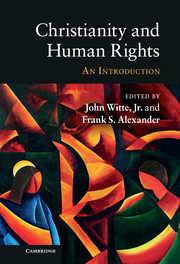Book contents
- Frontmatter
- Contents
- List of contributors
- Acknowledgements
- The first word: to be human is to be free
- Introduction
- FOUNDATIONS AND DEVELOPMENTS OF HUMAN RIGHTS
- 1 The Judaic foundation of rights
- 2 Ius in Roman law
- 3 Human rights and early Christianity
- 4 Human rights in the canon law
- 5 The modern Catholic Church and human rights: the impact of the Second Vatican Council
- 6 Rights and liberties in early modern Protestantism: the example of Calvinism
- 7 Modern Protestant developments in human rights
- 8 The issue of human rights in Byzantium and the Orthodox Christian tradition
- CHRISTIANITY AND THE MODERN HUMAN RIGHTS FRAMEWORK
- Biblical index
- Index
4 - Human rights in the canon law
Published online by Cambridge University Press: 05 June 2012
- Frontmatter
- Contents
- List of contributors
- Acknowledgements
- The first word: to be human is to be free
- Introduction
- FOUNDATIONS AND DEVELOPMENTS OF HUMAN RIGHTS
- 1 The Judaic foundation of rights
- 2 Ius in Roman law
- 3 Human rights and early Christianity
- 4 Human rights in the canon law
- 5 The modern Catholic Church and human rights: the impact of the Second Vatican Council
- 6 Rights and liberties in early modern Protestantism: the example of Calvinism
- 7 Modern Protestant developments in human rights
- 8 The issue of human rights in Byzantium and the Orthodox Christian tradition
- CHRISTIANITY AND THE MODERN HUMAN RIGHTS FRAMEWORK
- Biblical index
- Index
Summary
To some observers, the search for human rights in the law of the medieval church has seemed a vain effort. Was not the canon law the source of the notorious Spanish Inquisition, granting inquisitors the power to condemn men and women to death because of their religious opinions? Did it not lodge all legitimate authority in an autocratic papacy, granting to the Roman pontiff a potentially unlimited power over church and clergy? Did it not perpetuate the Roman law's institution of slavery, allowing religious institutions to hold men and women in perpetual servitude? It did. And these are not idle questions or the product of an ignorant and reflexive anti-Catholicism. The historical record shows that in many areas of human life the medieval church fully deserves the censure of a more enlightened age. Only by selective reading or artificial invocation of the principle that the values of one place and time should not be imposed upon another can one celebrate the achievements of the medieval church's law in the creation of human rights. The implications of many attractive doctrines from the Scriptures, such as the notion that man was created in the image of God that is ably presented in this volume by Jeremy Waldron, were either distinguished away or ignored by most medieval and early modern jurists.
Why, then, does the law of the medieval church deserve any place at all in a work devoted to Christianity and human rights?
- Type
- Chapter
- Information
- Christianity and Human RightsAn Introduction, pp. 99 - 112Publisher: Cambridge University PressPrint publication year: 2010
- 5
- Cited by

